3.2 Prefixes for Location
Prefixes are often used for terms related to locations both within and outside the body. It is important to note that although some prefixes are very similar in meaning and spelling, the way they are used varies greatly. Examples will be provided that demonstrate the proper use of prefixes in medical terms related to location. Some of these prefixes were introduced earlier in the book; however, the their use can be complex, and it is important to understand these concepts fully.
Table 3.1. Prefixes
| PREFIX | MEANING | EXAMPLE OF USE IN A MEDICAL TERM |
| ab- | away from | abduction |
| ad- | toward, near | adrenal |
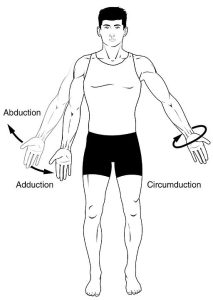
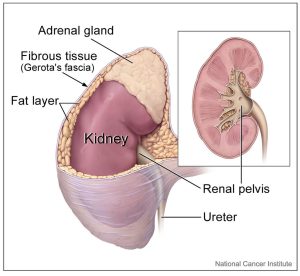
Key Concept
Table 3.2. Prefixes
| PREFIX | MEANING | EXAMPLE OF USE IN A MEDICAL TERM |
| endo- | within, in, inner | endocrine |
| exo- | out | exocrine |
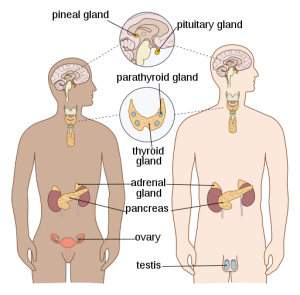
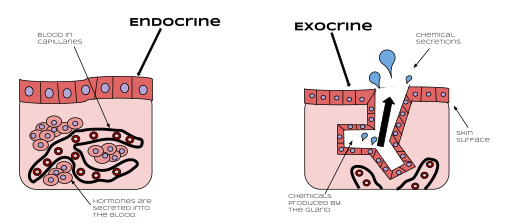
Key Concept
The endocrine system is made up of a series of glands that regulate hormones throughout the body; all the endocrine glands are shown in Fig. 3.3. It is important to differentiate between endocrine glands and exocrine glands (Fig. 3.4). Endocrine glands secrete hormones within the body and the blood, whereas exocrine glands secrete chemicals outside the body (Betts et al., 2013). Their names suggest their function in that endo- means “within” and exo- means “out” (Betts et al., 2013).
Table 3.3. Prefixes
| PREFIX | MEANING | EXAMPLE OF USE IN A MEDICAL TERM |
| ec- | out, outside | ectopic |
| ex- | out | excision |
| extra- | outside | extravascular |
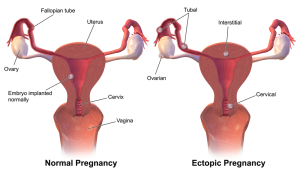
Key Concept
An ectopic pregnancy is a pregnancy outside its normal location. Fig. 3.5 shows the normal location of a pregnancy within the uterus and an ectopic pregnancy in an ovary, cervix, fallopian tubes, or abdomen. An ectopic pregnancy can be life threatening because the developing embryo has no room to grow. This condition can result in the surrounding area rupturing and causing the individual to hemorrhage internally (Betts et al., 2013).
As can be seen from Table 3.3, there are a number of prefixes with similar meanings. They are, however, used very differently in medical terminology. With practice and familiarity, it will become easier to know which prefix to use for a particular term.
Table 3.4. Prefixes
| PREFIX | MEANING | EXAMPLE OF USE IN A MEDICAL TERM |
| epi- | above, upon | epidural |
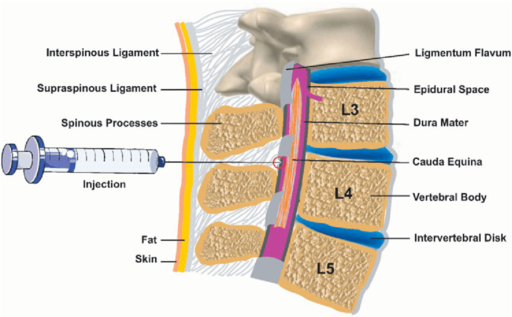
Key Concept
An epidural (Fig. 3.6) involves some form of injection into a patient’s spine to stop feeling to the area of the body below that point in the spinal cord. Epidurals are performed on patients in labour or for surgery to the lower extremities (NHS, 2020). A similar procedure is called a lumbar puncture or spinal tap, which involves taking a sample spinal fluid for analysis.
Table 3.5. Prefixes
| PREFIX | MEANING | EXAMPLE OF USE IN A MEDICAL TERM |
| in- | in, into | incision |
| inter- | between | intercellular |
| intra- | within | intradermal |
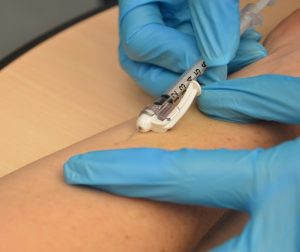
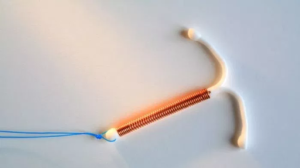
Key Concept
Intradermal injections are commonly used for tuberculosis testing, analgesics, anesthetics, and allergy testing. An intradermal injection is placed just below the skin surface, as seen in Fig. 3.7. Another use of the prefix intra- (“within”) is seen in the medical term intrauterine device (Fig. 3.8), which is a means of birth control that is placed within the uterus.
Table 3.6. Prefixes
| PREFIX | MEANING | EXAMPLE OF USE IN A MEDICAL TERM |
| para- | beside, near, along the side of | parathyroid |
| peri- | surrounding | pericardium |
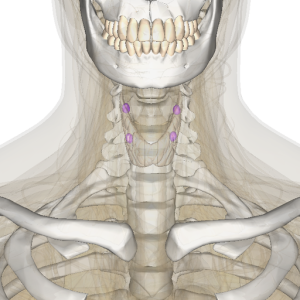
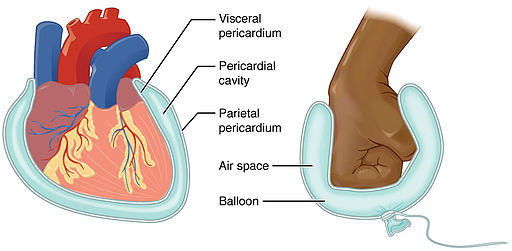
Key Concept
The parathyroid glands are located “along the side of” (para-) the thyroid gland. There are four of them, two on each side of the thyroid, and they are a part of the endocrine system. Fig 3.9 shows the location of the parathyroid glands (in pink) with the thyroid gland beneath.
The pericardium “surrounds” (peri-) the heart, and it both holds the heart in place and protects it (Medline Plus, 2022a). In Fig. 3.10, you can see that the pericardium provides cushioning for the heart, similar to the manner that the balloon in the figure is cushioning the fist.
Table 3.7. Prefixes
| PREFIX | MEANING | EXAMPLE OF USE IN A MEDICAL TERM |
| pro- | before, forward | prothrombin |
| pros- | before, forward | prosthesis |
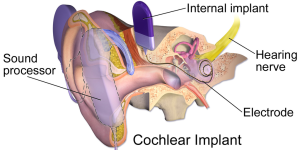
Key Concept
There are various types of medical prostheses, and the term prosthesis comes from the suffix -thesis (“put” or “place”) and the prefix pros- (“before” or “forward”); it literally means “to place before,” as in replacement. Prostheses, or prosthetic implants, can be used to replace a missing body part or function and are intended to restore normal function. A cochlear implant (Fig. 3.11) is an example of a medical prosthesis and is used to treat sensorineural deafness (Yawn et al., 2015).
Table 3.8. Prefixes
| PREFIX | MEANING | EXAMPLE OF USE IN A MEDICAL TERM |
| re- | back, behind | relapse |
| retro- | back, behind | retroperitoneal |
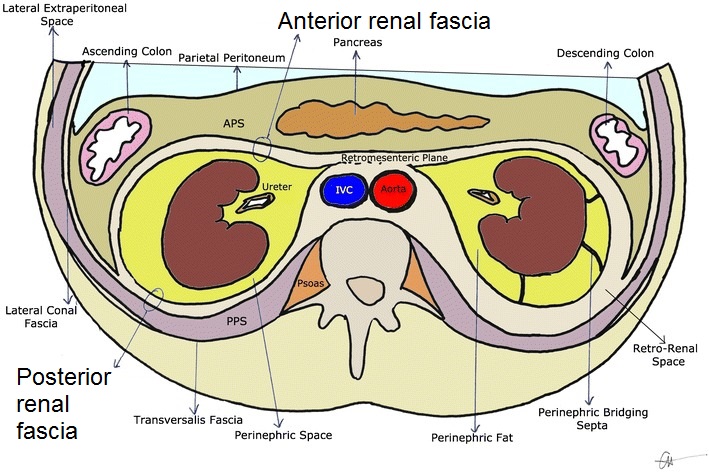
Key Concept
The two prefixes in Table 3.8 have the same meaning but are used differently depending on the medical term. The prefix re- (“back” or “behind”) can be found in terms such as relapse and remission. Relapse has the suffix -lapse (“to slide”), which makes the literal meaning “to slide back.” Patients experience a relapse when their symptoms come back, which is the opposite of a remission. Remission has the suffix -mission (“to send”), which makes the literal meaning “to send back.” When a patient is in remission, their symptoms and pathology lessen or go away.
The term retroperitoneal literally means “pertaining to” (-al) “behind” (retro-) “the peritoneum” (peritone/o). The retroperitoneal space contains the kidneys, adrenal glands, pancreas, nerve roots, lymph nodes, abdominal aorta, and inferior vena cava (Medline Plus, 2022b). Fig. 3.12 is an image of the retroperitoneal space and the organs present within it.
Table 3.9. Prefixes
| PREFIX | MEANING | EXAMPLE OF USE IN A MEDICAL TERM |
| sub- | under, less than | subdural |
| supra- | above | suprapubic |
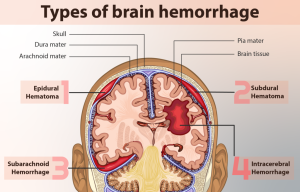
Key Concept
Figure 3.13 above was introduced earlier in the book and shows four different types of brain hematomas and hemorrhages. Now that you have a better understanding of prefixes, it is possible to interpret the different types shown in the diagram:
- An epidural hematoma is a mass of blood “above” (epi-) the dura mater.
- A subdural hematoma is a mass of blood “below” (sub-) the dura mater.
- A subarachnoid hemorrhage is excessive bleeding “below” (sub-) the arachnoid, which is a thin layer of tissue on the dura mater (Cleveland Clinic, 2022).
- The final type of hemorrhage in this figure is the intracerebral hemorrhage, which literally means “pertaining to” (-al) “withi”n (intra-) “the cerebrum” (cerebr/o).
Table 3.10. Prefixes
| PREFIX | MEANING | EXAMPLE OF USE IN A MEDICAL TERM |
| trans- | across, through | transdermal |
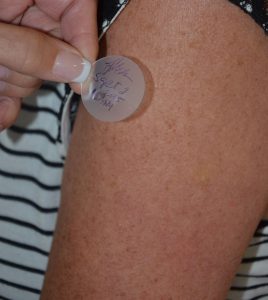
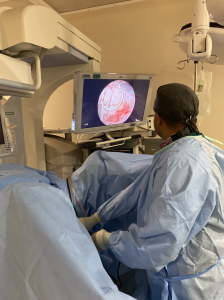
Key Concept
A transdermal patch is an effective route for giving medication to a patient. The medication is absorbed “through” (trans-) the skin. Nicotine patches are a common example of this medication route. Other common uses for transdermal patches include birth control, nitroglycerin for angina, and analgesics for pain. Fig. 3.14 shows an example of a transdermal patch being applied to a patient.
Transurethral resection of the prostate (TURP) is a procedure often used to treat benign prostatic hyperplasia (BPH) (Johns Hopkins, 2022). Fig. 3.15 shows the procedure being completed using an instrument that is placed “through” (trans-) the urethra to remove some of the enlarged prostate.
Exercises
Attribution
Unless otherwise indicated, material on this page has been adapted from the following resource:
Carter, K., & Rutherford, M. (2020). Building a medical terminology foundation. eCampusOntario. https://ecampusontario.pressbooks.pub/medicalterminology/ licensed under CC BY 4.0
References
Betts, J. G., Young, K. A., Wise, J. A., Johnson, E., Poe, B., Kruse, D. H., Korol, O., Johnson, J. E., Womble, M., & DeSaix, P. (2013). Anatomy and physiology. OpenStax. https://openstax.org/details/books/anatomy-and-physiology licensed under CC BY 4.0
Cleveland Clinic. (2022). Meninges. https://my.clevelandclinic.org/health/articles/22266-meninges
Johns Hopkins. (2022). Transurethral resection of the prostate (TURP). https://www.hopkinsmedicine.org/health/treatment-tests-and-therapies/transurethral-resection-of-the-prostate-turp#:~:text=A%20transurethral%20resection%20of%20the%20prostate%20(TURP)%20is%20surgery%20to,about%2012%20inches%20long%20and%20
Medline Plus. (2022a). Pericardial disorders. https://medlineplus.gov/pericardialdisorders.html#:~:text=The%20pericardium%20is%20a%20membrane,an%20inflammation%20of%20the%20sac
Medline Plus. (2022b). Retroperitoneal inflammation. https://medlineplus.gov/ency/article/001255.htm
NHS. (2022). Overview: Epidural. https://www.nhs.uk/conditions/epidural/#:~:text=An%20epidural%20is%20an%20injection,in%20some%20types%20of%20surgery
RxList. (2021). Definition of abduction. https://www.rxlist.com/abduction/definition.htm
Yawn, R., Hunter, J. B., Sweeney, A. D., & Bennett, M. L. (2015). Cochlear implantation: a biomechanical prosthesis for hearing loss. F1000Prime Reports, 7, 45. https://doi.org/10.12703/P7-45
Image Credits (images are listed in order of appearance)
Ab add and circumduction by Connexions, CC BY 3.0
Kidney and adrenal gland by Alan Hoofring, Public domain
1801 The Endocrine System by OpenStax, CC BY 3.0
Endocrine vs. Exocrine by Mntrue15, CC BY-SA 4.0
Ectopic Pregnancy by BruceBlaus, CC BY-SA 4.0
Epidural-anesthesia by Leila Kafshdooz, Houman Kahroba, Tayebeh Kafshdooz, Roghayeh Sheervalilou, and Hojjat Pourfathi, CC BY 4.0
Intradermal injection by British Columbia Institute of Technology (BCIT), CC BY 4.0
Alat-kontrasepsi-IUD by Pentiumsoak, CC BY-SA 4.0
Parathyroid by BodyParts3D and DBCLS, CC BY-SA 2.1 JP
Serous Membrane by Connexions, CC BY 3.0
Cochlear Implant by BruceBlaus, CC BY-SA 4.0
Retroperitoneal spaces by Goran Mitreski and Tom Sutherland, CC BY 4.0
An illustration of the different types of brain hemorrhage by myUpchar, CC BY-SA 4.0
Applying transdermal patch by British Columbia Institute of Technology (BCIT), CC BY 4.0
Urologist performing a TURP by UroJet, CC BY-SA 4.0
The act of moving (taking) away from
Pertaining to near the kidneys; small, triangular glands located on top of the kidneys
To secrete within; for example, endocrine glands secrete hormones
To secrete outside; for example, exocrine glands
Pertaining to out of place or position; often used in reference to an ectopic pregnancy, which is a pregnancy that occurs outside its normal location in the uterus
To cut out
Pertaining to outside the vascular system
Excessive discharge of blood, often from a trauma
Pertaining to upon the dura mater
The process of cutting into
Pertaining to between cells
Pertaining to within the skin
Pertaining to beside the thyroid
A structure surrounding the heart
Pertaining to before clotting
To place in front; an artificial limb
To slide back
Pertaining to behind the peritoneum
Pertaining to under the dura mater
Pertaining to above the pubic region
A mass of blood
Pertaining to across the skin

